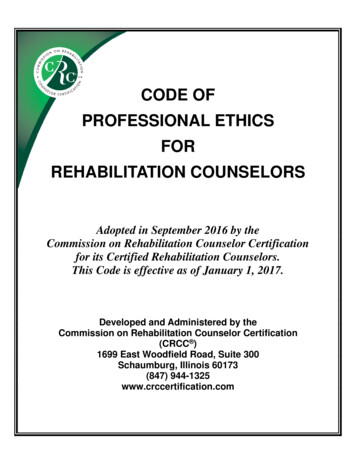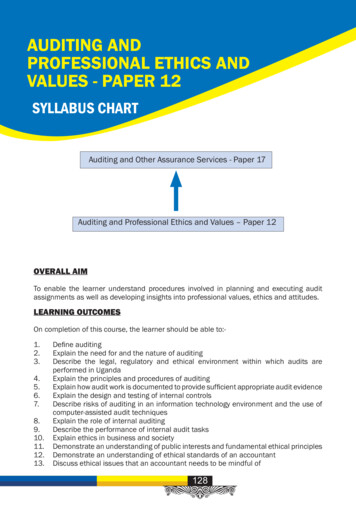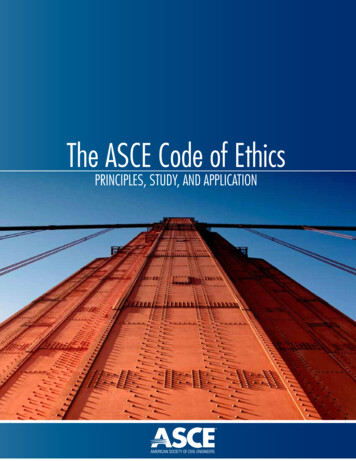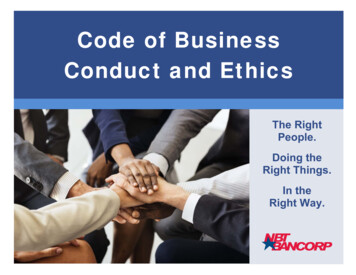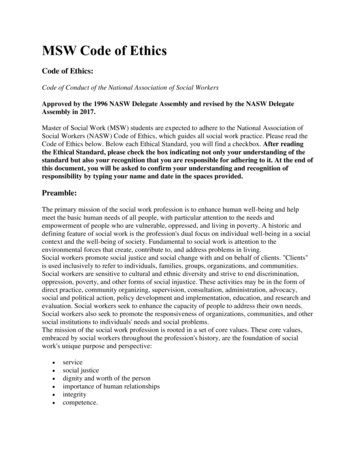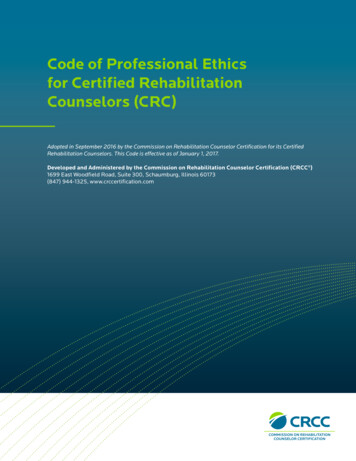
Transcription
Code of Professional Ethicsfor Certified RehabilitationCounselors (CRC)Adopted in September 2016 by the Commission on Rehabilitation Counselor Certification for its CertifiedRehabilitation Counselors. This Code is effective as of January 1, 2017.Developed and Administered by the Commission on Rehabilitation Counselor Certification (CRCC )1699 East Woodfield Road, Suite 300, Schaumburg, Illinois 60173(847) 944-1325, www.crccertification.com
TABLE OF CONTENTSPREAMBLE .4-6ENFORCEABLE STANDARDS OF ETHICAL PRACTICE. 6-35Section A: Counseling Relationship.6-10Introduction.6A.1. Welfare of Those Served.6-7A.2. Respecting Diversity. 7A.3. Client Rights.7-8A.4. Avoiding Value Imposition.8A.5. Roles and Relationships with Clients. 8-9A.6. Multiple Clients.9A.7. Group Work.9A.8. Termination and Referral.9-10A.9. End-of-Life Care for Terminally Ill Clients. 10Section B: Confidentiality, Privileged Communication, and Privacy. 10-13Introduction. 10B.1. Respecting Client Rights. 10-11B.2. Exceptions. 11B.3. Information Shared with Others. 11-12B.4. Groups and Families. 12B.5. Responsibility to Clients Lacking Capacity to Consent. 12B.6. Records and Documentation. 13B.7. Case Consultation. 13Section C: Advocacy and Accessibility. 14Introduction. 14C.1. Advocacy. 14C.2. Accessibility. 14Section D: Professional Responsibility.15-17Introduction. 15D.1. Professional Competence. 15D.2. Cultural Competence/Diversity. 15D.3. Functional Competence. 16D.4. Professional Credentials. 16D.5. Responsibility to the Public and Other Professionals.16-17D.6. Scientific Bases for Interventions.17Section E: Relationships with Other Professionals and Employers.17-18Introduction.17E.1. Relationships with Colleagues, Employers, and Employees.17-18E.2. Organization and Team Relationships. 18E.3. Provision of Consultation Services. 18Section F: Forensic Services. 19-20Introduction. 19F.1. Evaluee Rights. 19F.2. Forensic Competency and Conduct. 19-201
F.3. Forensic Practices.20F.4. Forensic Business Practices.20Section G: Assessment and Evaluation.21-23Introduction. 21G.1. Informed Consent. 21G.2. Release of Assessment or Evaluation Information. 21G.3. Proper Diagnosis of Mental Disorders. 21G.4. Competence to Use and Interpret Tests/Instruments.22G.5. Test/Instrument Selection.22G.6. Test/Instrument Administration Conditions.22G.7. Test/Instrument Scoring and Interpretation.22-23G.8. Test/Instrument Security.23G.9. Obsolete Tests/Instruments and Outdated Results.23G.10. Test/Instrument Construction.23Section H: Supervision, Training, and Teaching. 23-27Introduction.23H.1. Clinical Supervisor Responsibilities.23-24H.2. Clinical Supervisor Competence.24H.3. Roles and Relationships Between Clinical Supervisors and Supervisees.24H.4. Supervision Evaluation, Remediation, and Endorsement.24-25H.5. Rehabilitation Counselor Educator Responsibilities.25-26H.6. Rehabilitation Counselor Educator Competence.26H.7. Roles and Relationships Between Educators and Students. 26-27H.8. Education Evaluation, Remediation, and Endorsement.27Section I: Research and Publication. 27-30Introduction.27I.1. Research Responsibilities. 27-28I.2. Rights of Research Participants.28-29I.3. Reporting Results. 29I.4. Research Publications and Presentations.30I.5. Managing and Maintaining Boundaries.30Section J: Technology, Social Media, and Distance Counseling. 30-32Introduction.30J.1. Competence and Legal Considerations. 31J.2. Accessibility. 31J.3. Confidentiality, Informed Consent, and Security.31-32J.4. Social Media.32Section K: Business Practices. 32-34Introduction.32K.1. Advertising and Soliciting Clients. 32-33K.2. Client Records.33K.3. Fees, Bartering, and Billing. 33-34K.4. Termination and Referral.34Section L: Resolving Ethical Issues. 34-35Introduction.34L.1. Knowledge of Ethical Standards and the Law.342
L.2. Addressing Suspected Violations.34-35L.3. Conduct in Addressing Ethical Issues.35GLOSSARY OF TERMS. 36-383
PREAMBLEPurposeThe Code of Professional Ethics for RehabilitationCounselors, henceforth referred to as the Code, isdesigned to provide guidance for the ethical practiceof rehabilitation counselors.The basic objectives of the Code are to:(1) promote public welfare by specifying ethicalbehavior expected of rehabilitation counselors;(2) establish principles that guide ethical behaviorof rehabilitation counselors; (3) serve as an ethicalguide designed to assist rehabilitation counselorsin constructing a professional course of action thatbest serves those utilizing rehabilitation counselingservices; and (4) serve as the basis for the processingof alleged Code violations by certified rehabilitationcounselors.Rehabilitation Counseling Scope of PracticeRehabilitation counseling is a systematic processwhich assists persons with physical, mental,developmental, cognitive, and emotional disabilitiesto achieve their personal, career, and independentliving goals in the most integrated setting possiblethrough the application of the counseling process.The counseling process involves communication,goal setting, and beneficial growth or changethrough self-advocacy, psychological, vocational,social, and behavioral interventions. The specifictechniques and modalities utilized within thisrehabilitation counseling process may include,but are not limited to: assessment and appraisal; diagnosis and treatment planning; career (vocational) counseling; interventions to remove environmental,employment, and attitudinal barriers; consultation services among multiple partiesand regulatory systems; job analysis, job development, and placementservices, including assistance with employmentand job accommodations; and provision of consultation about and access torehabilitation technology.Rehabilitation counselors provide services withinthe Scope of Practice for Rehabilitation ice). Theydemonstrate beliefs, attitudes, knowledge, andskills to provide competent rehabilitation counselingservices and to work collaboratively with diversegroups of individuals, including clients, as well aswith programs, institutions, employers, and servicedelivery systems and provide both direct (e.g.,counseling) and indirect (e.g., case review, feasibilityevaluation) services. Regardless of the specific tasks,work settings, or technology used, rehabilitationcounselors demonstrate adherence to ethicalstandards and make reasonable efforts to ensurethe standards are vigorously enforced.Values and PrinciplesRehabilitation counselors are committed to facilitatingthe personal, economic, and social independenceof individuals with disabilities. In fulfilling thiscommitment, rehabilitation counselors recognizediversity and embrace a cultural approach in supportof the worth, dignity, potential, and uniquenessof individuals with disabilities within their socialand cultural context. They look to professionalvalues as an important way of living out an ethicalcommitment. The primary values that serve as afoundation for this Code include a commitment to: individual and group counseling treatmentinterventions focused on facilitating adjustments tothe medical and psychosocial impact of disability; respecting human rights and dignity; case management, referral, and servicecoordination; acting to alleviate personal distress and suffering; program evaluation and research; ensuring the integrity of all professional relationships; enhancing the quality of professional knowledgeand its application to increase professional andpersonal effectiveness;4
promoting empowerment through self-advocacyand self-determination; appreciating the diversity of human experienceand appreciating culture; emphasizing client strengths versus deficits; serving individuals holistically; and advocating for the fair and adequate provisionof services.These values inform principles. They representone important way of expressing a general ethicalcommitment that becomes more precisely definedand action-oriented when expressed as a principle.The fundamental spirit of caring and respect withwhich the Code is written is based upon six principlesof ethical behavior:Autonomy: To respect the rights of clients to be selfgoverning within their social and cultural framework.Beneficence: To do good to others; to promote thewell-being of clients.Fidelity: To be faithful; to keep promises and honorthe trust placed in rehabilitation counselors.Justice: To be fair in the treatment of all clients;to provide appropriate services to all.Clients/EvalueesThe primary obligation of rehabilitation counselorsis to clients, defined as individuals with or directlyaffected by a disability, who receive services fromrehabilitation counselors. At times, rehabilitationcounseling services may be provided to individualsother than those with disabilities. In some settings,clients may be referred to by other terms such as, butnot limited to, consumers.When employed to render an opinion for a forensicpurpose, rehabilitation counselors do not haveclients. In a forensic setting, the evaluee is theperson who is being evaluated. If a section orstandard in the Code does not seem to be relevantto forensic practice, rehabilitation counselors shouldnevertheless adhere to the spirit of the Code.Structure of the CodeThe Code consists of a Preamble, twelve mainSections, and a Glossary. The introductions toeach Section describe the ethical behavior andresponsibility to which rehabilitation counselorsaspire. The introduction helps set the tone for thatSection and provides a starting point that invitesreflection on the Enforceable Standards contained ineach Section of the Code. The Enforceable Standardsthat follow the introduction outline professionalresponsibilities and provide direction for fulfillingthose ethical responsibilities.Nonmaleficence: To do no harm to others.Veracity: To be honest.Commitment to Cultural DiversityRehabilitation counselors are aware that allind
counseling services may be provided to individuals other than those with disabilities. In some settings, clients may be referred to by other terms such as, but not limited to, consumers. When employed to render an opinion for a forensic purpose, rehabilitation counselors do not have clients. In a forensic setting, the evaluee is the
